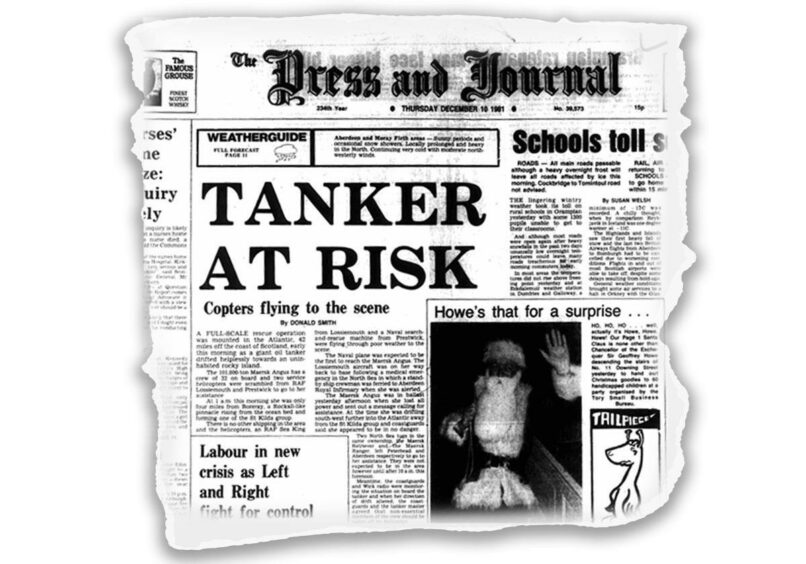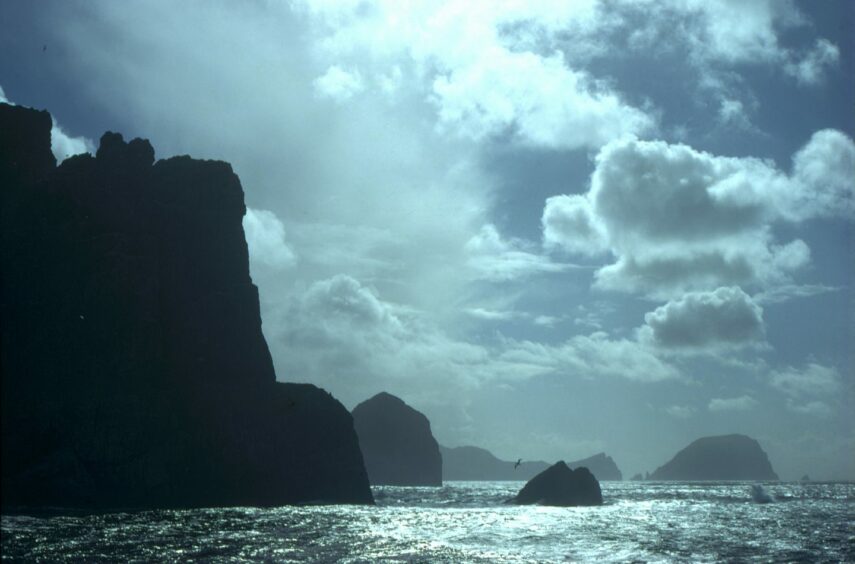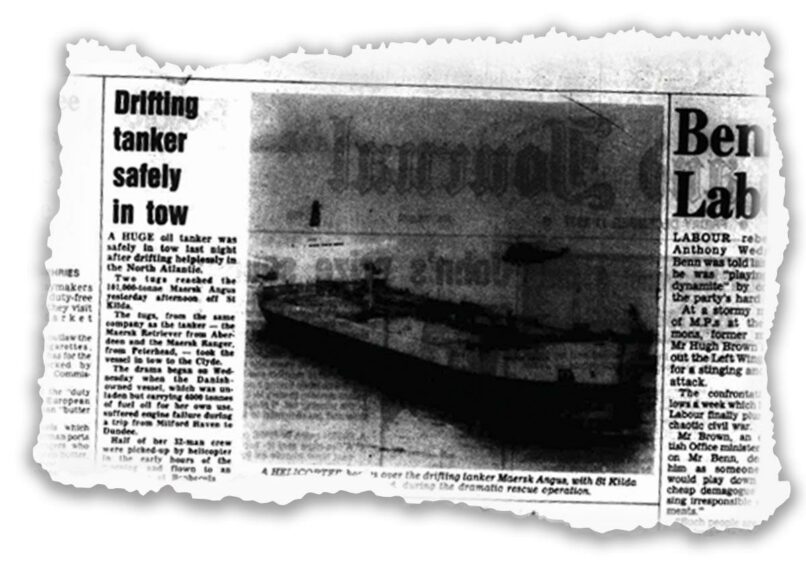It was the day when a stricken oil tanker moved perilously close to colliding with reefs off St Kilda in the Western Isles.
And, as news emerged that the Maersk Angus, a 101,000-ton vessel with a crew of 32 men on board, was drifting towards the ancient island archipelago, it sparked a concerted effort to prevent the possibility of a catastrophic accident in the Outer Hebrides.
On December 10 1981, the Press & Journal’s headline Tanker at Risk revealed that a massive rescue operation had been launched in response to reports that it had lost all power and was in danger of being drawn towards St Kilda; the place which has subsequently become a UNESCO dual world heritage site.
As emergency services responded to the incident, they learned that the Maersk craft was only four miles from Boreray, a giant Rockall-style pinnacle rising from the ocean bed – and this intensified efforts to stop the tanker in its tracks and make sure the crew were retrieved from the floating structure.
None of the rescuers were helped by poor weather in the region, but two service helicopters were scrambled from RAF Lossiemouth and Prestwick to go to her assistance.
That was only the start of a protracted mission, which involved different organisations across the north and north-east of Scotland.
And all of them were determined to prevent a potential ecological disaster.
‘A May Day message was issued’
Anybody who has ever visited St Kilda will realise that it is one of the most remote places anywhere in Britain with some of the most inhospitable conditions for travelling and particularly during the winter months.
Even as the helicopters headed from different destinations towards the Atlantic, 42 miles off the coast of Scotland, their personnel were forced to adapt to rapidly-changing circumstances.
The P&J reported: “Two North Sea tugs, the Maersk Retriever and the Maersk Ranger, left Peterhead and Aberdeen to go to her assistance, but they were not expected to reach the area until 10am this morning.
“Meanwhile, the coastguards and Wick radio were monitoring the situation on board the tanker and, when her direction of drift altered, the coastguards and the tanker master agreed that non-essential members of the crew should be taken off by helicopter as soon as possible.
“Shortly before midnight, a May Day message was passed through Wick radio, asking for immediate assistance, describing the situation as ‘critical’.
“Although the vessel is in ballast, she is carrying 4,000 tons of fuel oil.”
The drama had started when the Danish-owned vessel suffered engine failure during a trip from Milford Haven to Dundee.
At that stage, there was little indication the giant tanker would end up moving so alarmingly close to the archipelago with its famous sea stacks and bird colonies.
Nor that the crew of one of the helicopters would have to take 16 men off the Maersk Angus in the most treacherous of conditions.
But, even as the rest of the crew waited for the tugs to arrive hours later, Leading Aircrewman George Hewitson from Newcastle worked tirelessly to ensure the sailors’ safety while they were winched off the tanker.
He was calmness personified, despite the mission being hampered by darkness, high winds and raging, squally seas in the Atlantic.
Safe and sound
One of the crew, Alfie Bullock from South Shields in Tyneside, was among the personnel who were grateful for the professionalism of the rescue.
And, once he was back on terra firma at an army building on the island of Benbecula, he was quick to phone his wife Alice with the short but blessed message: “I’m safe and sound”.
Alice later revealed she had been “worried sick” about her husband after being contacted by Maersk and informed the vessel was in trouble in a storm.
Unsurprisingly, these next few hours were not a pleasant experience for her.
‘Who wouldn’t worry with that news?’
Mrs Bullock told the Evening Express: “The shipping company telephoned me at 8pm last night and said that the ship was in difficulties.
“They tried to reassure me that there was nothing to worry about, but who can stop themselves from worrying after hearing news like that?
“I was worried sick and I couldn’t sleep. But then, the phone rang again at three o’clock this morning and what a relief that was.
“It was Alfie ringing from the Hebrides and letting me know he was fine. He has been at sea for 40 years and is a very calm and collected type of person. So he didn’t sound at all alarmed at what had happened.”
She continued: “Alfie [who was the chief cook on the tanker] only joined the ship last week for a six-week trip.
“But he says the company are going to fly him home tonight.
“So at least now he will get the chance to spend Christmas at home in the next few weeks as a reward for his ordeal up there.”
Disaster was averted by experts
Mr Hewitson from Jesmond was the winchman on one of the two Sea King helicopters which had been scrambled to deal with the incident.
He and his colleagues’ exertions were backed up by the professionalism of the tug crew members while the bulk crew carrier London Earl arrived alongside the stranded tanker and made sure the rest of the men on the Maersk were allowed to escape and rejoin their workmates.
Eventually, it was a case of all’s well that ends well, but a subsequent report illustrated that the danger of disaster had been very real.
It confirmed: “The tanker was at one point just 2,000 metres [1.2 miles] from reefs off the island of Boreray and was drifting towards them.”
But for the emergency procedures and expertise of the Navy and calmness of the crew, this could have had a very different conclusion.
More like this:
Legacy of National Trust for Scotland worker Davie Fraser lives on at beloved St Kilda



